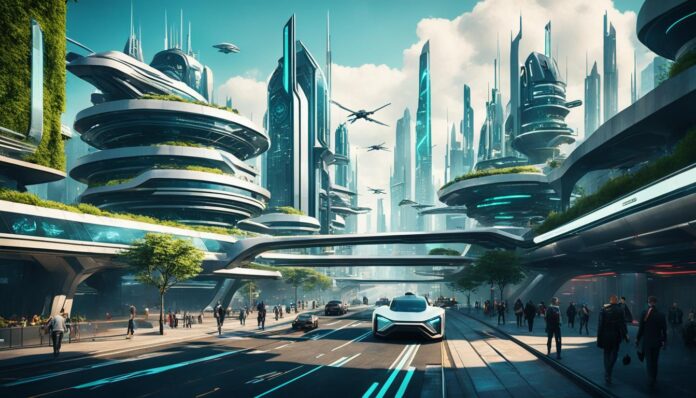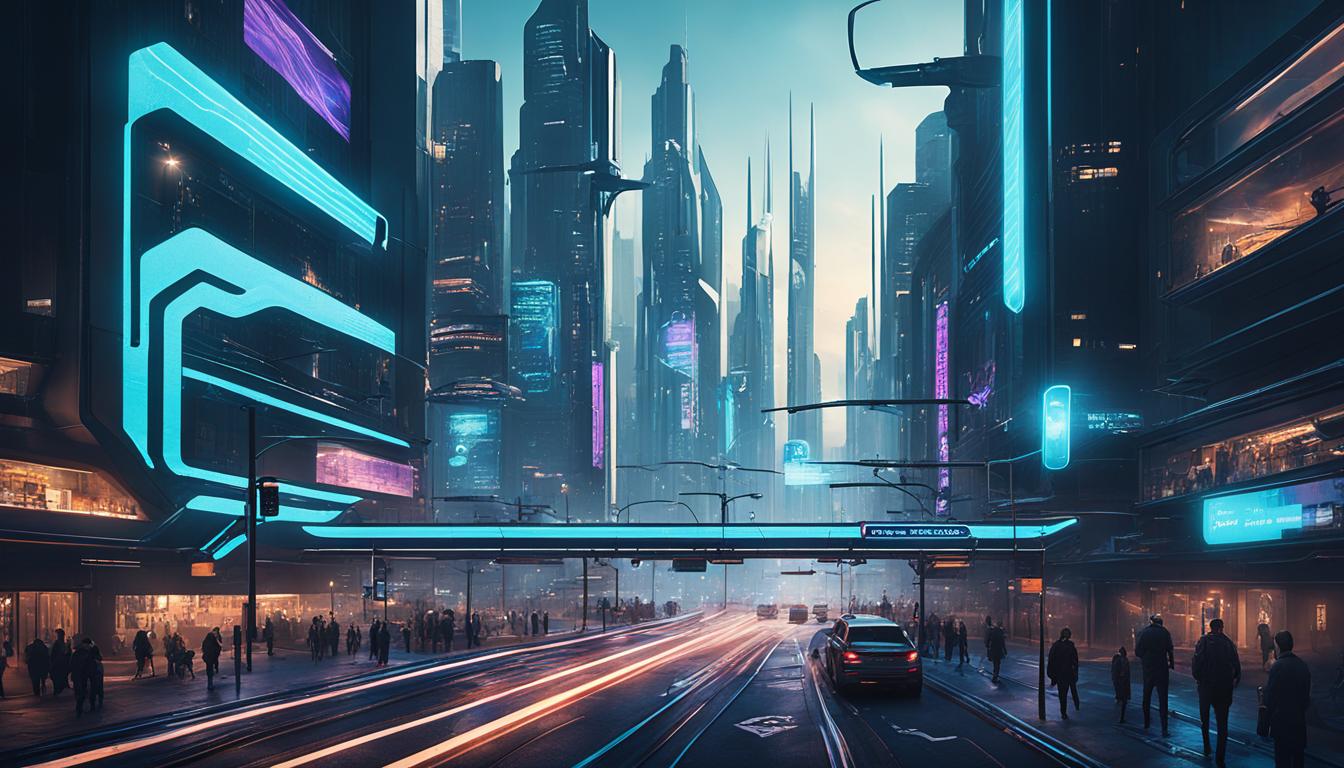
As cities become increasingly populated and resources more scarce, it is essential to have a sustainable plan for the cities of the future. According to the UN projections, by 2050, 68% of the world’s population will live in cities, and urbanization is expected to grow by another 2.5 billion people. Smart growth, a new concept in urban planning, aims to achieve this goal by designing efficient and innovative urbanizations that promote economic development while preserving the environment.
Key Takeaways
- The rise of smart cities is transforming urban planning to address the challenges of growing populations and limited resources.
- Integrating smart city technologies, such as the Internet of Things (IoT), Artificial Intelligence (AI), blockchain, and big data analytics, is crucial for efficient resource management and sustainable development.
- Enhanced public transportation systems, bolstered public safety, and citizen engagement are key priorities as cities adapt to smart city technologies.
- 5G connectivity will enable the seamless integration and real-time monitoring of smart city infrastructure, empowering urban planners to make data-driven decisions.
- Sustainable urban development initiatives, such as renewable energy sources and green infrastructure, will be at the forefront of smart city planning by 2025.
The Rise of Smart Cities and Their Technological Foundation
At the core of every smart city lies a robust foundation built on the integration of smart city technologies, seamlessly woven into the urban infrastructure to foster efficiency, sustainability, and enhanced quality of life. The Internet of Things (IoT) serves as the nervous system of smart cities, connecting a vast array of devices and sensors embedded in the urban fabric, from street lamps to water pipes, enabling real-time monitoring and management.
The Internet of Things (IoT) as the Nervous System
The IoT provides the connectivity and data-gathering capabilities that power smart cities, allowing for the real-time analysis and optimization of urban infrastructure. By deploying a network of interconnected sensors and devices, cities can monitor everything from traffic patterns and energy consumption to environmental conditions and public safety, enabling informed decision-making and proactive problem-solving.
Artificial Intelligence (AI) as the Brain
Artificial Intelligence (AI) plays a crucial role in transforming raw data from the IoT into actionable insights, serving as the “brain” of smart cities. Advanced algorithms and machine learning models can analyze vast amounts of information, identify patterns, and make informed predictions to optimize city operations, from traffic management to resource allocation and beyond.
Blockchain Technology for Secure and Transparent Transactions
Blockchain technology offers smart cities a secure and transparent platform for managing a wide range of transactions, from financial payments to supply chain logistics. By leveraging the decentralized, immutable nature of blockchain, cities can enhance trust, traceability, and accountability in their operations, improving efficiency and reducing the risk of fraud or tampering.
Big Data Analytics for Extracting Insights
Big data analytics is the cornerstone of smart city decision-making, enabling city officials to transform the vast amounts of data generated by IoT devices and other sources into meaningful insights. By harnessing the power of advanced analytics and visualization tools, smart cities can identify patterns, predict trends, and make data-driven decisions to optimize resource allocation, improve service delivery, and enhance the overall quality of life for their citizens.
| Technology | Application | Benefits |
|---|---|---|
| Internet of Things (IoT) | Real-time monitoring and management of urban infrastructure | Improved efficiency, resource optimization, and data-driven decision-making |
| Artificial Intelligence (AI) | Analyzing data, identifying patterns, and making informed predictions | Enhanced problem-solving, resource allocation, and service delivery |
| Blockchain technology | Secure and transparent management of transactions and logistics | Increased trust, traceability, and accountability in city operations |
| Big data analytics | Transforming data into actionable insights for decision-making | Optimized resource allocation, improved service delivery, and enhanced quality of life |
How will urban planning adapt to smart city technologies by 2025?
Smart city technologies are revolutionizing urban planning, offering a suite of features and applications designed to enhance efficiency, sustainability, and the quality of life for residents. From efficient resource management to enhanced public transportation systems, cities are embracing innovative solutions that leverage the power of 5G connectivity and citizen engagement.
Efficient Resource Management
Efficient Resource Management is a cornerstone of smart city operations, ensuring the optimal use of water, energy, and waste systems through the use of sensors and smart meters. By monitoring and analyzing real-time data, urban planners can make informed decisions to optimize resource consumption, reduce waste, and promote sustainable development initiatives.
Enhanced Public Transportation Systems
Smart city technologies are transforming public transportation, making it more efficient, accessible, and responsive to the needs of citizens. Connected vehicles, intelligent traffic management systems, and real-time data analytics enable urban planners to optimize traffic flow, reduce congestion, and improve the overall public transportation experience.
Bolstered Public Safety and Security
Smart city technologies are also playing a crucial role in enhancing public safety and security. Cutting-edge sensors, surveillance systems, and advanced analytics powered by Artificial Intelligence (AI) enable urban planners to monitor and respond to emergencies more effectively, while also improving overall public safety.
Sustainable Urban Development Initiatives
Smart city technologies are at the forefront of promoting sustainable urban development. From renewable energy systems to green infrastructure, urban planners are leveraging innovative solutions to reduce the environmental impact of cities and create more livable, resilient communities that enhance the quality of life for residents.

| Smart City Technology | Application | Benefits |
|---|---|---|
| Internet of Things (IoT) | Connected infrastructure and real-time monitoring | Improved resource management, enhanced public services, and data-driven decision-making |
| Artificial Intelligence (AI) | Predictive analytics, autonomous systems, and intelligent automation | Optimized transportation, enhanced public safety, and streamlined city operations |
| Blockchain Technology | Secure and transparent transactions, digital identity management | Improved efficiency, reduced fraud, and enhanced citizen trust in government services |
| 5G Connectivity | High-speed, low-latency wireless communication | Enabler for real-time data exchange, remote monitoring, and smart city applications |
Conclusion
The rise of smart cities represents a pivotal shift towards embracing cutting-edge technologies to solve the pressing challenges of urban living. By integrating groundbreaking innovations such as the Internet of Things (IoT), Artificial Intelligence (AI), blockchain, and big data analytics into the fabric of urban infrastructure, cities across the United States are setting new standards for service delivery, sustainability, and livability.
As urbanization continues to accelerate, the need for efficient, resilient, and citizen-centric cities has never been more essential. The implementation of smart city technologies is paving the way for a future where resources are managed more effectively, transportation systems are enhanced, public safety is bolstered, and sustainable development initiatives thrive.
Ultimately, the transformation of cities into smart, technologically-advanced hubs is not just a vision for the future, but a reality being realized today. By embracing this digital revolution, urban planners, local governments, and community stakeholders can work together to create vibrant, livable cities that meet the needs of their growing populations and secure a more sustainable tomorrow.
FAQ
What is the role of the Internet of Things (IoT) in smart city technologies?
The Internet of Things (IoT) serves as the nervous system of smart cities, connecting a vast array of devices and sensors embedded in urban infrastructure, from street lamps to water pipes, enabling real-time monitoring and management.
How will artificial intelligence (AI) impact the future of smart cities?
Artificial intelligence (AI) acts as the brain of smart cities, providing the advanced analytics and decision-making capabilities required to optimize urban operations and enhance the overall quality of life for residents.
What is the role of blockchain technology in smart city initiatives?
Blockchain technology enables secure and transparent transactions, facilitating the seamless exchange of data and the implementation of smart contracts within smart city ecosystems.
How can big data analytics contribute to the development of smart cities?
Big data analytics allows cities to extract valuable insights from the massive amounts of data generated by IoT sensors and other urban infrastructure, enabling data-driven decision-making and the optimization of city operations.
What are some of the key ways in which urban planning will adapt to smart city technologies by 2025?
Urban planning will adapt to smart city technologies by 2025 through initiatives such as efficient resource management, enhanced public transportation systems, bolstered public safety and security, and sustainable urban development.
